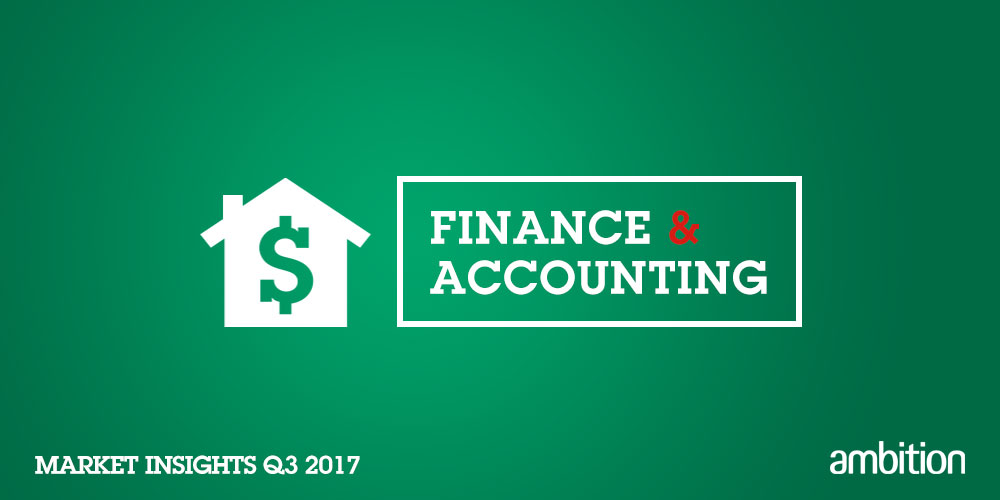Please beware of recruitment scams that are currently targeting jobseekers. Click here for further advice.

Finance & Accounting Market Insights Q3 2017
Throughout Q2 2017, demand for skilled Finance & Accounting talent has continued to gather pace in Malaysia. The country continued to benefit from the offshoring of functions from higher cost locations in the Asia region, resulting in an accompanying demand for professionals to support these functions.
Demand for Technical Financial Accountants and Auditors
In the past few months, within commercial organisations, there has been a steady increase in the demand for Audit-trained and qualified accountants to go into or manage statutory reporting and consolidation teams. There was also a significant demand for Auditors among finance professionals as they look to build up their overall strength in Malaysia by 2020.
Finance business partnership remained important
The demand for Finance Business Partners, Commercial Accountants and Finance Planning Analysts continued in Q2, as companies looked for strong support across commercial functions when it comes to decision-making.
In particular, we witnessed companies growing manufacturing and supply chain operations in Malaysia, leading to an increased demand for Finance & Accounting professionals with strong experience partnering with these operational business functions. Such talent will continue to see an acute shortage in the market, and job seekers with relevant experience will be in an advantageous position when looking for jobs.
Demand in Shared Services
In Q2 2017, the demand for Shared Services finance professionals remained acute, an effect of Malaysia’s continued success as a burgeoning finance shared services hub that can support regional and global functions. Whilst local talent was often preferred, we saw a growing trend of establishing regional and global process hubs in Malaysia, which also demanded global talent.
Outlook is bright for Finance & Accounting professionals
With the ongoing trend of regional and global functions being established in Malaysia and the continuing need for strong finance business partnership, as well as audit and compliance professionals, we expect Q3 2017 to be bright for Finance & Accounting professionals.
There will be many career opportunities for these professionals in the upcoming months.
Finance & Accounting
Salary Report for Q3 2017*
Commerce & Industry |
|
|
Job title | Years of experience | Annual salary range (RM$) |
Audit / Internal Control | ||
Head of Audit | 12+ | 252K–300K |
Internal / External Audit Manager | 5–10 | 100K–180K |
Internal / External Auditor | 3–5 | 80K–100K |
Financial Accounting | ||
CFO | 15+ | 400K–600K |
Finance Director | 12–15 | 240K–360K |
Regional Financial Controller | 10+ | 200K–300K |
Financial Controller | 8–10 | 180K–230K |
Finance / Accounting Manager | 6–10 | 84K–180K |
Financial Accountant | 3–6 | 70K–100K |
Accounts Payable / Accounts Receivable Accountant | Up to 8 years | 50K–100K |
Management Accounting | ||
Management Accounting Manager | 8–10 | 120K–144K |
Senior Management Accountant | 5–8 | 90K–120K |
Management Accountant | 3–5 | 60K–90K |
Planning & Analysis | ||
Head of Planning & Analysis | 10–12 | 216K–300K |
Financial Planning & Analysis Manager | 8–10 | 180K–240K |
Senior Financial Analyst | 6–8 | 96K–144K |
Financial Analyst | 3–6 | 50K–96K |
Tax | ||
Vice President / Head of Tax / Tax Director | 12+ | 220K–300K |
Tax Manager | 8–10 | 120K–200K |
Tax Accountant / Senior Accountant | 3–7 | 50K–120K |
Treasury | ||
Head of Treasury | 10–12 | 200K–300K |
Treasury Manager | 7–10 | 150K–190K |
Treasury Accountant | 3–6 | 70K–100K |
*Notes about salary table:
Titles and levels vary from organisation to organisation.
The salary ranges given are only approximate guides. For tailored salary advice, please contact us directly.
12-month base salaries are assumed.
All other benefits and bonuses are in addition to these figures.
Bonus ranges can vary significantly from company to company and will be influenced by market conditions, business and individual performances. Bonus ranges from 1 month at the low end to 100%+ at the upper.
Holiday entitlements range from 12–25 days with senior executives not usually receiving less than 18 days. Less than 15 is very rare and 20 days is becoming the norm.
Healthcare policies are standard.
Pension plans vary with some companies offering greater than the standard contribution. Top up schemes can increase employer contribution levels as much as 15– 20% of the base salary for senior executives.







![[Blog] Lwa Jake Abdullah](https://image-assets.eu-2.volcanic.cloud/api/v1/assets/images/cca8b2422e47cb740ec3fa7be2d9710e?size=480x500%3E)